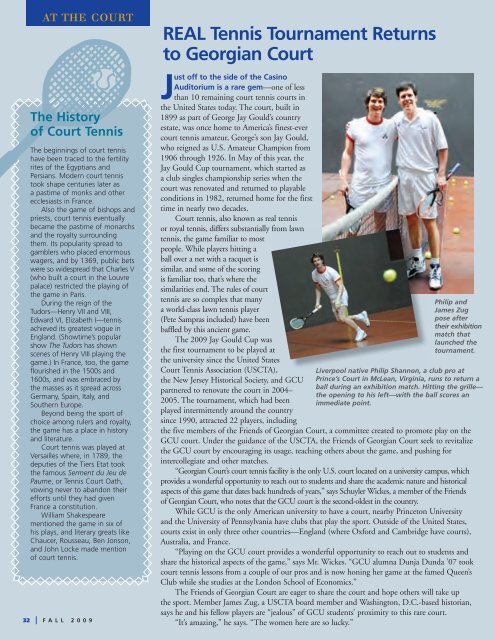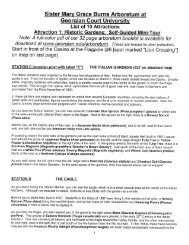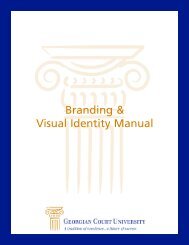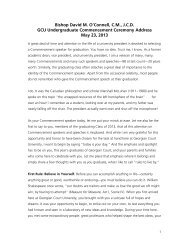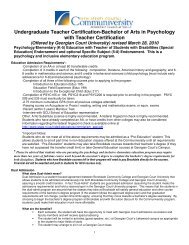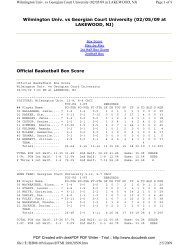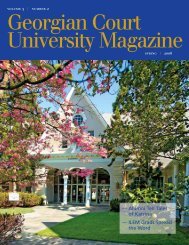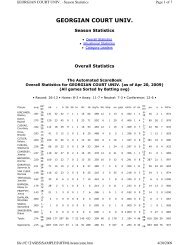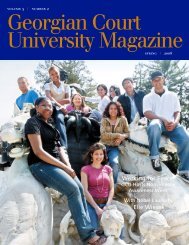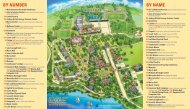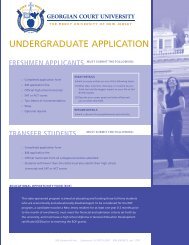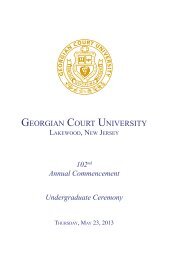Georgian Court University Magazine
Georgian Court University Magazine
Georgian Court University Magazine
You also want an ePaper? Increase the reach of your titles
YUMPU automatically turns print PDFs into web optimized ePapers that Google loves.
at the court<br />
The History<br />
of <strong>Court</strong> Tennis<br />
The beginnings of court tennis<br />
have been traced to the fertility<br />
rites of the Egyptians and<br />
Persians. Modern court tennis<br />
took shape centuries later as<br />
a pastime of monks and other<br />
ecclesiasts in France.<br />
Also the game of bishops and<br />
priests, court tennis eventually<br />
became the pastime of monarchs<br />
and the royalty surrounding<br />
them. Its popularity spread to<br />
gamblers who placed enormous<br />
wagers, and by 1369, public bets<br />
were so widespread that Charles V<br />
(who built a court in the Louvre<br />
palace) restricted the playing of<br />
the game in Paris.<br />
During the reign of the<br />
Tudors—Henry VII and VIII,<br />
Edward VI, Elizabeth I—tennis<br />
achieved its greatest vogue in<br />
England. (Showtime’s popular<br />
show The Tudors has shown<br />
scenes of Henry VIII playing the<br />
game.) In France, too, the game<br />
flourished in the 1500s and<br />
1600s, and was embraced by<br />
the masses as it spread across<br />
Germany, Spain, Italy, and<br />
Southern Europe.<br />
Beyond being the sport of<br />
choice among rulers and royalty,<br />
the game has a place in history<br />
and literature.<br />
<strong>Court</strong> tennis was played at<br />
Versailles where, in 1789, the<br />
deputies of the Tiers Etat took<br />
the famous Serment du Jeu de<br />
Paume, or Tennis <strong>Court</strong> Oath,<br />
vowing never to abandon their<br />
efforts until they had given<br />
France a constitution.<br />
William Shakespeare<br />
mentioned the game in six of<br />
his plays, and literary greats like<br />
Chaucer, Rousseau, Ben Jonson,<br />
and John Locke made mention<br />
of court tennis.<br />
32 | FALL 2009<br />
REAL Tennis Tournament Returns<br />
to <strong>Georgian</strong> <strong>Court</strong><br />
Just off to the side of the Casino<br />
Auditorium is a rare gem—one of less<br />
than 10 remaining court tennis courts in<br />
the United States today. The court, built in<br />
1899 as part of George Jay Gould’s country<br />
estate, was once home to America’s finest-ever<br />
court tennis amateur, George’s son Jay Gould,<br />
who reigned as U.S. Amateur Champion from<br />
1906 through 1926. In May of this year, the<br />
Jay Gould Cup tournament, which started as<br />
a club singles championship series when the<br />
court was renovated and returned to playable<br />
conditions in 1982, returned home for the first<br />
time in nearly two decades.<br />
<strong>Court</strong> tennis, also known as real tennis<br />
or royal tennis, differs substantially from lawn<br />
tennis, the game familiar to most<br />
people. While players hitting a<br />
ball over a net with a racquet is<br />
similar, and some of the scoring<br />
is familiar too, that’s where the<br />
similarities end. The rules of court<br />
tennis are so complex that many<br />
a world-class lawn tennis player<br />
(Pete Sampras included) have been<br />
baffled by this ancient game.<br />
The 2009 Jay Gould Cup was<br />
the first tournament to be played at<br />
the university since the United States tes<br />
<strong>Court</strong> Tennis Association (USCTA),<br />
the New Jersey Historical Society, and GCU<br />
partnered to renovate the court in 2004–<br />
2005. The tournament, which had been<br />
played intermittently around the country<br />
since 1990, attracted 22 players, including<br />
Philip and<br />
James Zug<br />
pose after<br />
their exhibition<br />
match that<br />
launched the<br />
tournament.<br />
Liverpool native Philip Shannon, a club pro at<br />
Prince’s <strong>Court</strong> in McLean, Virginia, runs to return a<br />
ball during an exhibition match. Hitting the grille—<br />
the opening to his left—with the ball scores an<br />
immediate point.<br />
the five members of the Friends of <strong>Georgian</strong> <strong>Court</strong>, a committee created to promote play on the<br />
GCU court. Under the guidance of the USCTA, the Friends of <strong>Georgian</strong> <strong>Court</strong> seek to revitalize<br />
the GCU court by encouraging its usage, teaching others about the game, and pushing for<br />
intercollegiate and other matches.<br />
“<strong>Georgian</strong> <strong>Court</strong>’s court tennis facility is the only U.S. court located on a university campus, which<br />
provides a wonderful opportunity to reach out to students and share the academic nature and historical<br />
aspects of this game that dates back hundreds of years,” says Schuyler Wickes, a member of the Friends<br />
of <strong>Georgian</strong> <strong>Court</strong>, who notes that the GCU court is the second-oldest in the country.<br />
While GCU is the only American university to have a court, nearby Princeton <strong>University</strong><br />
and the <strong>University</strong> of Pennsylvania have clubs that play the sport. Outside of the United States,<br />
courts exist in only three other countries—England (where Oxford and Cambridge have courts),<br />
Australia, and France.<br />
“Playing on the GCU court provides a wonderful opportunity to reach out to students and<br />
share the historical aspects of the game,” says Mr. Wickes. “GCU alumna Dunja Dunda ’07 took<br />
court tennis lessons from a couple of our pros and is now honing her game at the famed Queen’s<br />
Club while she studies at the London School of Economics.”<br />
The Friends of <strong>Georgian</strong> <strong>Court</strong> are eager to share the court and hope others will take up<br />
the sport. Member James Zug, a USCTA board member and Washington, D.C.-based historian,<br />
says he and his fellow players are “jealous” of GCU students’ proximity to this rare court.<br />
“It’s amazing,” he says. “The women here are so lucky.”


